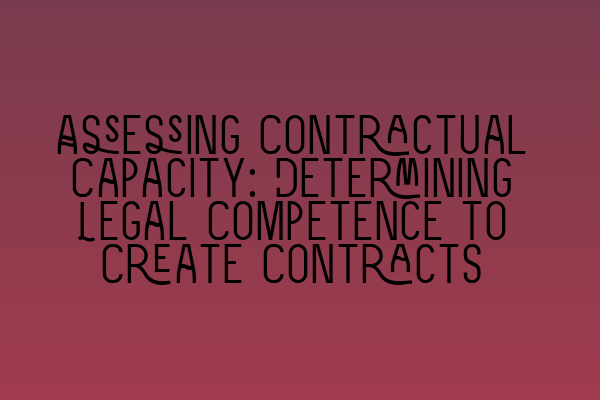Assessing Contractual Capacity: Determining Legal Competence to Create Contracts
Contractual capacity is a foundational principle in contract law, ensuring that parties entering into agreements have the legal competence to bind themselves to the terms of the contract. It is important for solicitors and legal professionals to assess the contractual capacity of their clients before advising them on entering into any contract. In this article, we will explore the concept of contractual capacity, the factors that determine legal competence, and the implications of lacking contractual capacity.
Understanding Contractual Capacity
Contractual capacity refers to the mental and legal ability of a person to enter into a contract and be bound by its terms. Not everyone has the ability to create a legally enforceable contract, and it is the responsibility of solicitors and legal professionals to assess a client’s capacity before proceeding with any contractual agreement.
Factors Determining Legal Competence
There are several factors that determine an individual’s legal competence to create contracts:
- Age: Age is an important factor in determining contractual capacity. Minors, individuals under the age of 18, are generally considered to lack the legal capacity to enter into contracts. However, there are some exceptions to this rule, such as contracts for necessities or contracts approved by a court.
- Mental Capacity: Mental capacity refers to an individual’s ability to understand the nature and consequences of entering into a contract. Individuals with mental illnesses or cognitive impairments may lack the mental capacity necessary to create a contract. It is crucial to assess a person’s mental capacity by considering their comprehension and decision-making abilities.
- Intoxication: Contracts entered into while under the influence of drugs or alcohol may not be legally enforceable. Intoxication can impair an individual’s judgment, reasoning, and decision-making abilities, rendering them incapable of fully understanding the terms of the contract.
- Undue Influence: If a person is under the influence of another and is coerced or manipulated into entering into a contract against their will, their contractual capacity may be compromised. Solicitors must be vigilant in identifying any signs of undue influence to protect their clients’ interests.
- Fraud and Misrepresentation: Contracts entered into based on fraudulent or misrepresented information may be voidable. If a person lacks the capacity to understand the true facts or is intentionally misled by the other party, the contract may be deemed unenforceable.
Implications of Lacking Contractual Capacity
When a person lacks the contractual capacity to enter into a contract, the legal implications can be significant:
- Voidable Contracts: Contracts entered into by individuals lacking capacity are considered voidable, meaning they can be challenged and deemed unenforceable. This protects individuals who may have been taken advantage of or unfairly bound by contractual terms they did not fully understand.
- Restitution and Damages: If a contract is found to be unenforceable due to a lack of capacity, the injured party may be entitled to restitution or damages. This ensures that individuals are adequately compensated for any losses suffered as a result of entering into an invalid contract.
- Legal Consequences: Parties who knowingly enter into contracts with individuals lacking capacity may face legal consequences, including accusations of exploitation or unfair business practices. It is essential to prioritize ethical conduct and protect the best interests of clients.
Conclusion
Assessing contractual capacity is a vital part of contract law, ensuring that agreements are entered into by parties with the legal competence to understand and be bound by the terms. Solicitors and legal professionals play a crucial role in evaluating a client’s contractual capacity before proceeding with any contractual agreement. By considering factors such as age, mental capacity, intoxication, undue influence, and fraud, legal professionals can protect their clients and uphold the integrity of the legal system.
Are you preparing for the SQE Contract Law examination? Check out our SQE 1 Practice Exam Questions to enhance your knowledge and improve your chances of success. We also offer SQE 1 Practice Mocks FLK1 FLK2 to help you familiarize yourself with the exam format.
If you’re looking for comprehensive preparation for SQE 2, our SQE 2 Preparation Courses are designed to equip you with the necessary skills and knowledge to excel in the examination.
For those preparing for SQE 1, our SQE 1 Preparation Courses provide a comprehensive overview of the topics covered in the exam, helping you achieve your desired results.
Stay updated with the latest SRA SQE Exam Dates to plan and manage your study schedule effectively.
